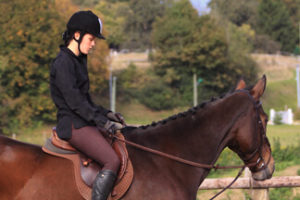They say you learn more from losing than you do from winning. Kids also learn a lot about effort and attitude by the way their parents react to a win or loss in sports, and competitive riding is no exception. Here are five tips for when your son or daughter does not get the blue ribbon…
1) Tell them how much you enjoy seeing them ride
It’s no secret that kids love praise, but what they love even more is knowing that their parents enjoy seeing them take part in sports and activities. When we focus too much on the results alone, it becomes more of a job than an interest. As kids are growing up, we should allow them to learn to love a sport on their own terms. If we put too much emphasis on athletic achievement, not only does it become a waste of money, but Alissa Quart writes, in her book Hot House Kids: How the Pressure to Succeed Threatens Childhood, that it is “positively harmful. The over-cultivated can develop self-esteem problems and performance anxiety.” Before and after the event, remind your child that you enjoy seeing them ride and compete. Success can be measured more accurately in the simple thrill of riding and achieving personal milestones than in winning the blue ribbon.
2) Remind them that a strong bond with a horse is more important than winning
Riding isn’t just about winning, but about having fun and enjoying the relationship between horse and rider. Horses are special creatures, and developing a strong bond with a horse is an accomplishment in itself. There is a great deal of research that shows that children with horse companions develop many cognitive benefits from having the bond with the animal. The benefits they can attain include a sense of responsibility, an increase in self-esteem, and the development of core competencies that enhance relationships.
3) Express pride in their effort and commitment
So many times, kids can be turned off by activities and skills that require time, effort, and dedication to master. Let your child know how much you appreciate the effort they are putting into the care of their horse or pony and in the time they dedicate to developing riding skills. Children learn by the examples we set as parents and adults. Let them know that it is okay to not win and that putting forth a solid effort is its own reward. Success shouldn’t be measured in trophies, but in the effort that is shown.
4) Allow them to voice their feelings and explore their emotions
Before you are tempted to comment on a competition, it’s important to let the child express how he or she felt it went. Was there something they felt that they could improve on? Instead of suggesting what they could have done better, be a good listener and give them a safe space to vent. More than likely, your child knows what went wrong, or what they did well. Even if they have a perfect ride, there is always going to be someone who is better, has more experience, or has put more hours behind the reins.. It can be frustrating to work hard and not win, but that experience plays a big role in future success.
5) Encourage them to keep going
Even the most understanding and encouraging parent can encounter the challenge of a child who is ready to quit after an early setback. Encourage them to keep going and keep trying. Help them understand that very few people win their first time, and no one wins every time – not even professionals. In every competition, there will be very talented people who do not win, but the lessons learned in defeat are what makes them successful in the future. Improved performance comes with experience, and experience comes from a mixture of success and failure.
Quart, A. (2007). Hothouse kids: how the pressure to succeed threatens childhood. New York, NY: Penguin Group.

